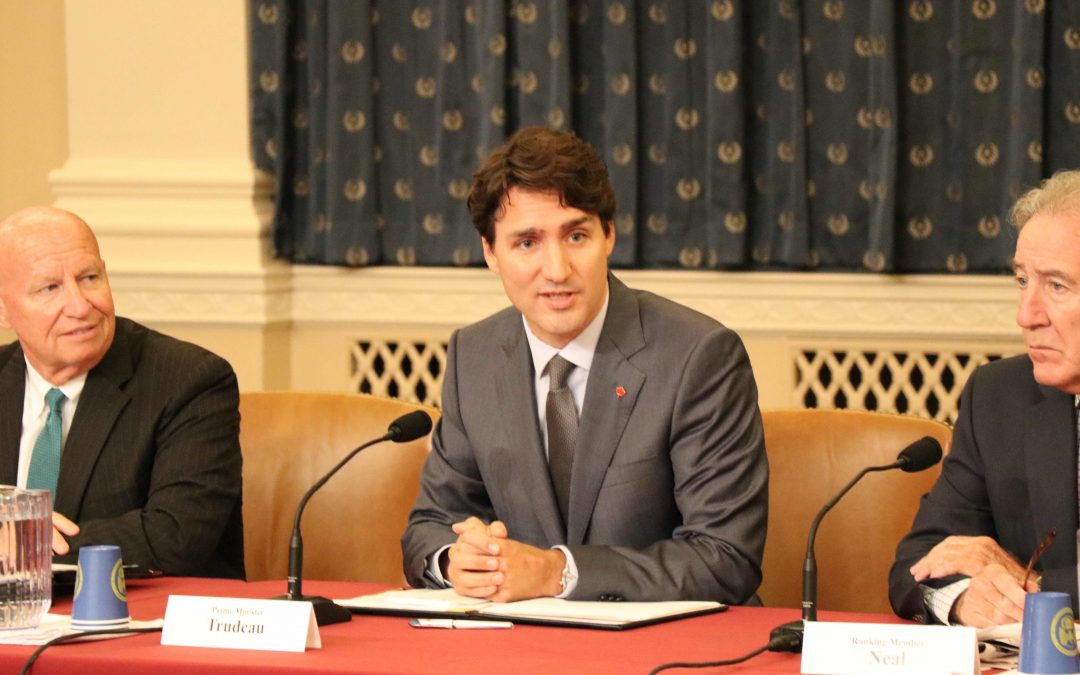WASHINGTON — Canadian Prime Minister Justin Trudeau, in town for the fourth round of North American Free Trade Agreement negotiations, met Wednesday with President Donald Trump, who said if the renegotiations don’t meet U.S. needs, the trade pact may end. But Trudeau was more optimistic that a new deal could be reached.
Before going to the White House, Trudeau told the House Ways and Means Committee that Canada has benefited immeasurably from the trade agreement worked out with the United States and Mexico in 1994, and Americans have profited as well.
“In terms of trade, the U.S. sells more to Canada than it does to China, Japan and the UK combined,” said Trudeau.
With $321 million worth of U.S. goods being exported to Canada, an estimated 9 million American jobs depend on the U.S.-Canada trade and investment, according to the Business Council of Canada.
Ways and Means Chairman Kevin Brady, R-Texas, noted that although trade relationship between the two countries is “mutually beneficial” through NAFTA, it is not without its challenges.
“Over the past few months, our negotiators have worked at an unprecedented pace to bring NAFTA into the 21st century, to more effectively address issues related to the digital economy and strengthen trade rules to enhance our competitiveness globally,” Brady said.
The trade agreement has left member countries struggling to update the agreement, especially as the growing online retail market has modernized commerce. Negotiators are also faced with how to incorporate a U.S. demand – called a “poison pill” that could sink the deal – that more of the parts of Americans’ automobiles be manufactured In the U.S.
Brady emphasized a unified stance on trade and investment between the two countries.
“When North America wins, America wins,” he said. “And the American people win as well.”
Trump has been openly critical of the agreement, describing it as an unlevel playing field for American manufacturing.
According to the U.S. Census Bureau, the United States exported $2.2 trillion of goods worldwide but imported $2.7 billion in 2016, making the $502 billion deficit the largest in the world.
Sitting with Trudeau in the Oval Office on Wednesday afternoon, the president said that it was possible that the three countries won’t be able to make a deal, but didn’t rule out the possibility of success.
“It’s time after all these years, and we’ll see what happens,” Trump said. “I’ve been opposed to NAFTA for a long time in terms of the fairness of NAFTA. I said we’ll renegotiate, and, I mean, I think Justin understands. If we can’t make a deal, it will be terminated and that will be fine.”
When asked if he believes NAFTA is dead, the president told reporters that it was “something you would know in the not-so-distant future.”
Both Trump and Trudeau emphasized the strong relationship the U.S. and Canada continue, and the dependable ally they have in one another. As President Trump hinted at a possible bilateral agreement between the U.S and Canada, Mexico, remained absent from the public discourse.
Trudeau rounded out his day at the Canadian embassy, where he acknowledged the challenging nature of the negotiations but remained optimistic about NAFTA’s future.
“We continue to demonstrate that it is very possible to get a win-win-win, as Vice President Pence said a number of month ago,” he said.
The prime minister heads to Mexico City on Thursday to meet with Mexican President Enrique Pena Nieto, where trade likely be the key topic in their conversations.

